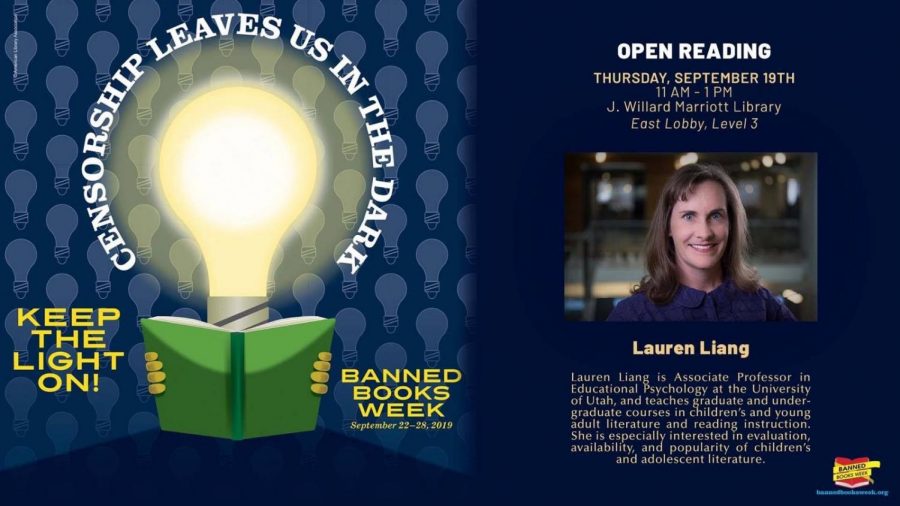‘Censorship is Not a Viewpoint:’ Marriott Library Hosts a Banned Books Event
September 22, 2019
On Sep. 19, 2019, the J. Willard Marriott Library hosted the sixth annual Banned Books event.
The event focused on censored books that have been taken out of schools or libraries. Typically, a book is banned because a reader finds its materials to be against their views or beliefs, and requests a librarian to remove it from the library system.
The Marriott Library celebrated books that have met this fate throughout history. The event began with a small speech from Alberta Comer, a University Librarian and the Dean and Director. She started by welcoming students to the event and stated why it is imperative to bring banned books into the light. She said the purpose of this event “is to raise awareness about the cultural and intellectual freedom to read any and all books, free of censorship … If you look over the material that has been challenged or banned, it is material that speaks on the human condition.”
After Comer’s speech, the event kicked off with the featured speaker Dr. Lauren Liang, an Associate Professor 0f Educational Psychology and president of the Children’s Literature Assembly. “Books that are removed from libraries end up becoming very, very popular,” she said. “They do this by librarians, educators, and community members fighting to bring these books back to where they belong.”
“Censorship is not a viewpoint. It is not saying ‘I think this is harmful and others shouldn’t see it.’ It is saying ‘I want everyone not to be able to see this or have access to it.’” Afterward, she talked about what censorship truly means. In her words, since most challenged books are children’s books, what is really being challenged is diversity.
To back her claim, Dr. Liang read through part of the graphic novel “Drama” by Raina Telgemeier, which has been placed in the American Library Association’s Top Ten Most Challenged Books list four out of the seven years since it’s been released in 2012. The section that was read introduced the protagonist, Callie, who introduces readers to her life as a middle-schooler and her love for theater. After the opening, the story explains her interaction with her friend Jesse, who comes out to her as gay. Later in the story, after the female lead actor of a school play refuses to perform, Jesse steps up to fill the role, and is met with a crowd who loves his performance. Student reactions to “Drama” have been largely neutral or positive — “kids say it’s just like their school,” Dr. Liang said.
The reasoning for a book’s banning must be listed in a complaint. According to the ALA, “Drama” was challenged for being “confusing,” having LGBTQ characters, being sexually explicit and having an “offensive political viewpoint.”
Once Dr. Liang finished, the floor was opened up for anyone with material to come up and read. Multiple titles were read, including “Of Mice and Men,” “The Hate U Give,” “In a Dark Dark Room,” “Captain Underpants,” “Sex is a Funny Word,” “And Tango Makes Three,” “Literature Suppressed on Political Grounds,” “The Color Purple,” “Animal Farm,” “Literature Suppressed on Social Grounds,” “A People’s History of the United States” and “Bloods: An Oral History of the Vietnam War.”
In the final minutes of the event, Dr. Liang told audience members how to fight censorship: “It’s all about doing your part as a citizen. Showing up to libraries to request the books stay in their collection and even going as far as disputing complaints.”
Banned Book Week starts on Sept. 22 and lasts until Sept. 28. To see a list of frequently challenged books click here.







